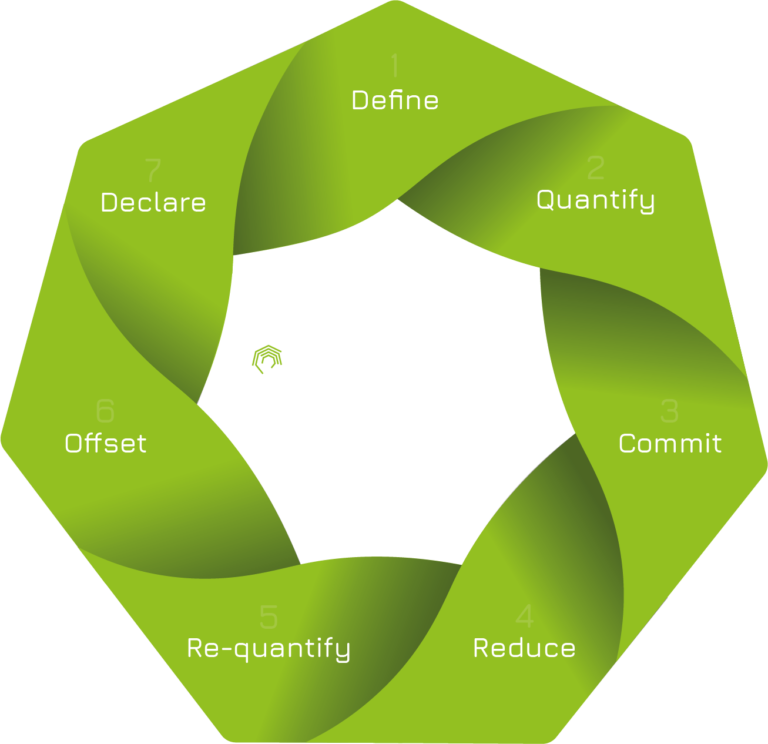As businesses worldwide strive to achieve carbon neutrality and comply with international standards such as ISO 14064 (carbon verification) and PAS 2060 (carbon neutrality), addressing both direct and indirect greenhouse gas (GHG) emissions has become an urgent priority. While implementing emission reduction measures throughout company operations and supply chains is paramount, achieving absolute zero emissions is often impractical, or even impossible, for many businesses. Carbon offsetting is a powerful tool that allows companies to compensate for their residual emissions and contribute to carbon neutrality objectives by investing in projects and initiatives that reduce or remove GHG emissions elsewhere.
Carbon offsetting has become a popular and versatile solution that encompasses a wide range of projects, including renewable energy, afforestation and reforestation, carbon capture and storage, and community-based initiatives that support vulnerable populations in adapting to climate change. When utilised as part of a balanced and strategic carbon management approach, carbon offsetting can not only help achieve carbon neutrality goals but also yield substantial co-benefits in terms of environmental conservation, social equity, and economic development.
This comprehensive blog article explores the importance of carbon offsetting, the various offsetting options available, considerations for choosing the right offset projects, and the vital support Carbonology® offers in devising a credible carbon management strategy that reflects your business’s commitment to environmental responsibility. By understanding and strategically leveraging carbon offsetting in conjunction with other sustainability initiatives, companies can effectively progress towards carbon neutrality while simultaneously addressing broader societal and environmental challenges.
Understanding Carbon Offsetting Options
There is a diverse range of carbon offsetting options available to businesses, each with its unique characteristics and benefits. Some of the most common categories of offset projects include:
1) Renewable Energy: Investments in clean energy projects, such as wind, solar, and hydro power, contribute to a transition away from fossil fuels and promote low-carbon development.
2) Forestry and Land Use: These projects focus on afforestation, reforestation, and improved land management practices that enhance carbon sequestration and protect biodiversity.
3) Carbon Capture and Storage: Supporting the development and deployment of innovative carbon capture, utilisation, and storage (CCUS) technologies reduces or removes emissions from industrial processes and power generation.
4) Community-Based Initiatives: These projects provide social and economic benefits to vulnerable populations, addressing climate change adaptation, poverty alleviation, and education.
Selecting the Right Carbon Offsetting Projects
When choosing suitable offsetting projects for your business, consider the following factors:
1) Alignment with Company Values: Ensure that the selected projects resonate with your company’s mission, values, and sustainability objectives.
2) Environmental Integrity: Verify the authenticity and effectiveness of the offset projects by looking for credible, third-party certifications such as Verified Carbon Standard (VCS), Gold Standard, or Climate Action Reserve (CAR).
3) Co-Benefits: Prioritize projects that provide additional environmental, social, or economic benefits beyond GHG emission reduction or removal.
4) Location: Consider the geographical location of the projects, as investing in local or regional initiatives can offer more tangible benefits to your organisation and stakeholders.
Carbonology®’s Support in Developing a Robust Carbon Offsetting Strategy
Carbonology® offers valuable guidance and support to businesses seeking to effectively integrate carbon offsetting into their carbon management strategies. These include:
1) Carbon Footprint Assessment: Carbonology® can help businesses quantify their GHG emissions, identifying sources of direct and indirect emissions and setting emission reduction targets aligned with ISO 14064 and PAS 2060 standards.
2) Project Evaluation and Selection: Carbonology®’s team of experts can assist in evaluating and selecting appropriate carbon offsetting projects that best align with your business priorities, emission reduction targets, and sustainability goals.
3) Monitoring and Reporting: Carbonology® can provide support in tracking and reporting the outcomes of your carbon offsetting initiatives, ensuring transparency, accountability, and compliance with ISO 14064 and PAS 2060 requirements.
4) Employee Engagement and Training: Equip your workforce with the knowledge and skills necessary to support your carbon offsetting strategy through Carbonology®’s carbon literacy and sustainability training resources.
Maximising the Value of Carbon Offsetting in Achieving Carbon Neutrality
To optimise the potential of carbon offsetting as part of your overall carbon management strategy, consider these best practices:
1) Adopt a Hierarchy of Actions: Prioritise internal emission reduction measures and resource efficiency initiatives before resorting to carbon offsetting, treating offsets as a complementary component of your holistic carbon strategy.
2) Choose Quality Over Quantity: Focus on the quality and credibility of your selected offset projects, rather than solely on the number of carbon credits purchased.
3) Demonstrate Accountability: Establish clear governance structures and procedures for your carbon offsetting strategy, setting emission reduction targets, allocating responsibilities, and fostering transparency.
4) Communicate and Showcase your Commitments: Share the details of your carbon offsetting initiatives with your stakeholders, including the overarching strategy, selected projects, and achieved outcomes, demonstrating your commitment to sustainability and carbon neutrality.
Conclusion:
Carbon offsetting is a valuable tool in the journey to carbon neutrality, offering businesses the opportunity to contribute to global climate change mitigation efforts while addressing residual emissions beyond their immediate control. By carefully selecting high-quality offset projects that align with company values and provide broader co-benefits, businesses can demonstrate their commitment to environmental responsibility, compliance with ISO 14064 and PAS 2060 standards, and long-term sustainable growth.
Through Carbonology®’s expert guidance and support, organisations can develop and execute a robust carbon offsetting strategy that enhances their overall carbon management approach, fostering trust among stakeholders, and driving meaningful progress towards a low-carbon, climate-resilient future. With our help, you can be on your way to carbon neutrality.

